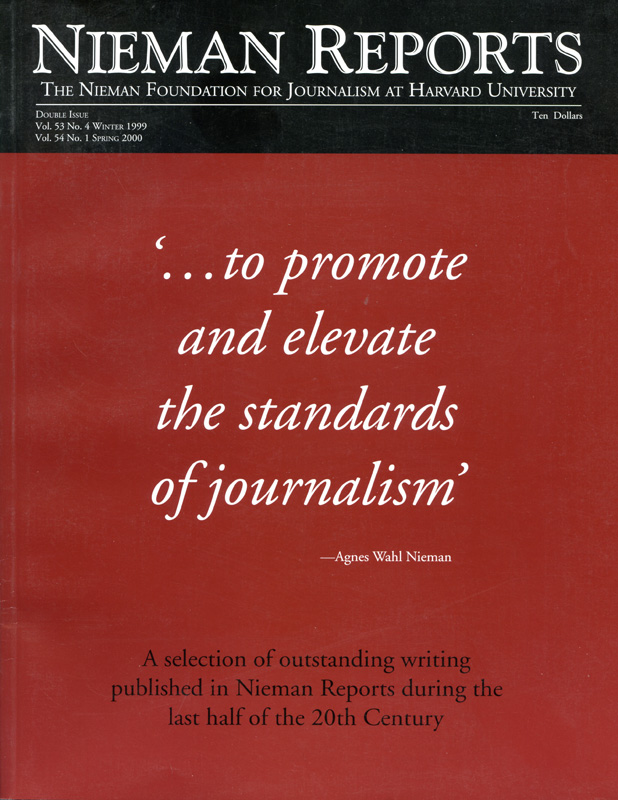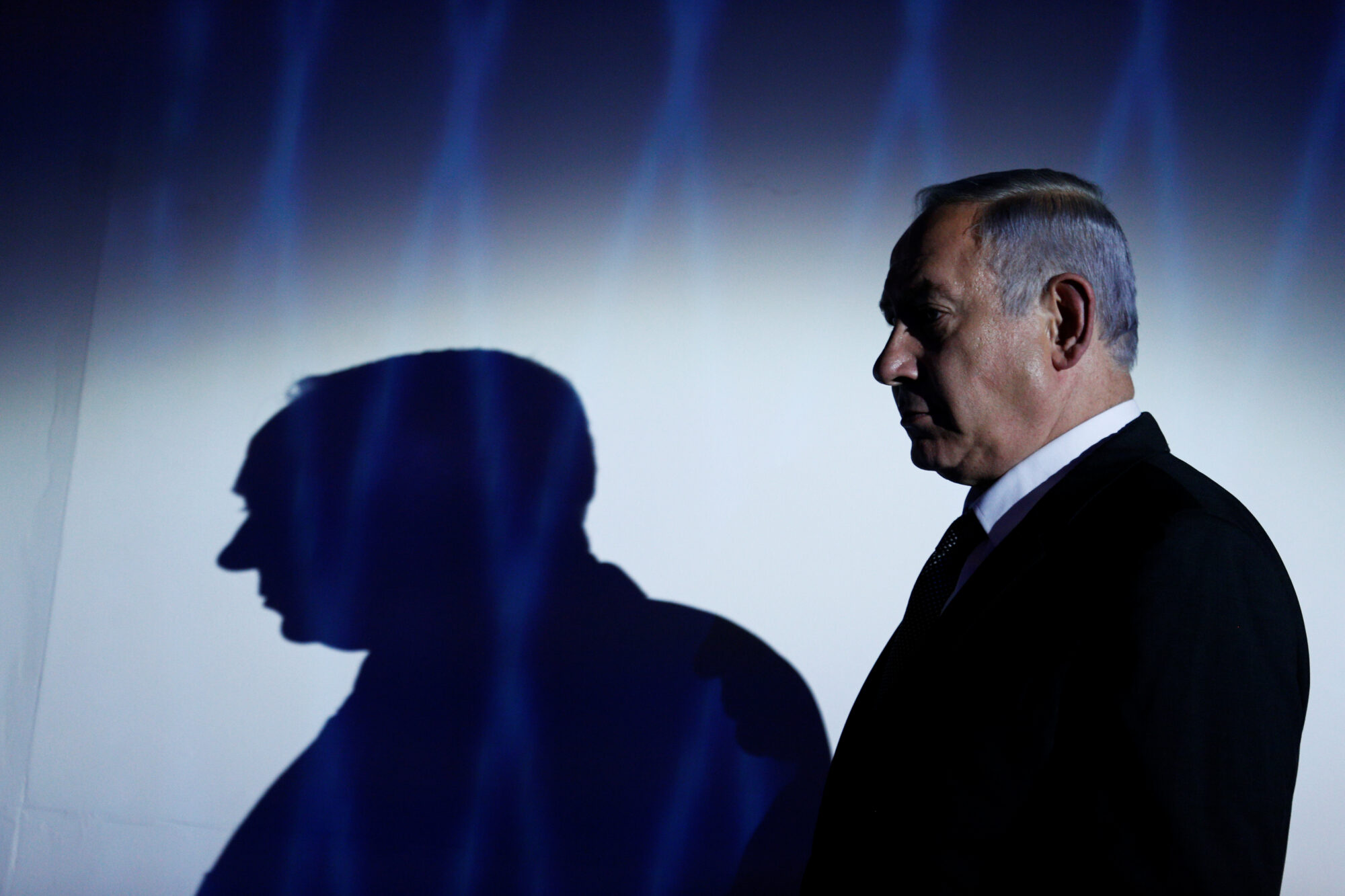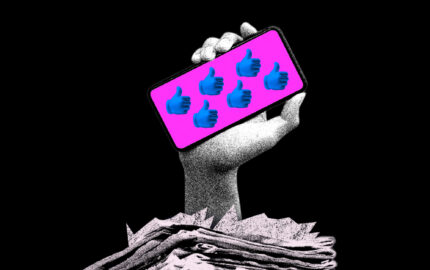[This article originally appeared in the July 1947 issue of Nieman Reports.]
How Is Press To Be Criticized?
Walter Lippmann, Column
March 27 — The problem is a specially important form of the question: Who polices the policeman? The commissioners are not, I think, so clear on this point as they might have been. "We recommend," they say, that the members of "the press engage in vigorous mutual criticism." There they needed, but missed, the advice of the working members of the press.
Mutual criticism, like marital criticism, if it is publicly made, is too hard for mortal man to take. The good critic should be an outsider, like Mr. Hutchins, as regards the press. For personal detachment is necessary to good criticism.
While vigorous criticism of the press is most necessary to the welfare of the press, it will have to come from those who are outside the press. Those who wish to work at the criticism of the press will find this report an admirable introduction to the subject.
Sensible but Inconclusive
Barry Bingham, Louisville Courier-Journal Book Review
March 28 — It seemed a sound idea to use non-professionals to survey the press, since the purpose was not a technical study of newspaper methods but a broad consideration of how our papers are serving the American public. At best, the choice of personnel produced serious and challenging views of a basic American problem. At worst, lack of familiarity with the mores of newspaper offices resulted in a certain naiveté and awkwardness in exploring unfamiliar ground.
The prime failure of the report is its curious inconclusiveness. It makes a case against the press with dignity and seriousness. When it comes to describing the remedies it ladles out great masses of confusion.
Dumb Professors
George Sokolsky, Tampa, Florida, Daily Times
April 9 — The professors include under the word "press" the following items in the order given, which shows what they know about it: the radio, newspapers, motion pictures, magazines and books.
The "press" is the newspaper. Radio is not a newspaper any more than vaudeville. Radio is a show. A newscaster, like a female singer, is hired for his voice. He reads stuff dished up by one of the newspaper wire services. True, the networks often hire newspapermen to report from here and abroad, but this is secondary to the show business.
It just shows how dumb these professors are to put radio in front of the newspaper in a study of the press. It would be as correct for my jury of saloonkeepers to put football ahead of anthropology and astronomy as educational features of the American university. And maybe saloonkeepers would be more accurate.
Now You See What the Report Was About
Chicago Sun Editorial (unsigned)
March 29 — Last Thursday a distinguished Commission on the Freedom of the Press, headed by Chancellor Robert Hutchins of the University of Chicago, published its report. The principle conclusion was that the American press is often biased and irresponsible and that only a responsible press can remain free.
The Chicago Tribune published the news account of the report on page 40 under the headline: "'A Free Press,' (Hitler Style) Sought for U.S." The "news" story contained such gems of objectivity as these:
"The book apparently is a major effort in the campaign of a determined group of totalitarian thinkers led by such housetop shouters as Harold L. Ickes, Morris Ernst, George Seldes and Archibald MacLeish, who want to discredit the free press of America or put it under a measure of government control." (Of those mentioned only Mr. MacLeish was a member of the Commission.)
"The Commission is clothed with the same degree of public authority which covers any 13 patrons in a Madison St. saloon."
This "news" account is in itself a pretty conclusive documentation of the Commission's charge of bias and irresponsibility in the press. But for an equally striking example, consider the handling of another story in the same edition of the Tribune.
On page one it streamer-headlined the charge of Senator Brooks that the federal government was responsible for the Centralia mine disaster. This fitted into Colonel McCormick's strategy of trying to elect a Republican mayor by attacking a Democratic national administration. The diligent reader had to turn back to page eight to discover, under a cleverly obscure headline, the news that the Tribune's own Governor Green had received warnings of unsafe conditions at the Centralia mine before the disaster and had brushed them off.
Now do you see what Dr. Hutchins' Commission was talking about when it said that "the few who are able to use the machinery of the press have not provided a service adequate to the needs of the society, but have engaged in practices which the society condemns and which, if continued, it will inevitably undertake to regulate or control"?
How Is Press To Be Criticized?
Walter Lippmann, Column
March 27 — The problem is a specially important form of the question: Who polices the policeman? The commissioners are not, I think, so clear on this point as they might have been. "We recommend," they say, that the members of "the press engage in vigorous mutual criticism." There they needed, but missed, the advice of the working members of the press.
Mutual criticism, like marital criticism, if it is publicly made, is too hard for mortal man to take. The good critic should be an outsider, like Mr. Hutchins, as regards the press. For personal detachment is necessary to good criticism.
While vigorous criticism of the press is most necessary to the welfare of the press, it will have to come from those who are outside the press. Those who wish to work at the criticism of the press will find this report an admirable introduction to the subject.
Sensible but Inconclusive
Barry Bingham, Louisville Courier-Journal Book Review
March 28 — It seemed a sound idea to use non-professionals to survey the press, since the purpose was not a technical study of newspaper methods but a broad consideration of how our papers are serving the American public. At best, the choice of personnel produced serious and challenging views of a basic American problem. At worst, lack of familiarity with the mores of newspaper offices resulted in a certain naiveté and awkwardness in exploring unfamiliar ground.
The prime failure of the report is its curious inconclusiveness. It makes a case against the press with dignity and seriousness. When it comes to describing the remedies it ladles out great masses of confusion.
Dumb Professors
George Sokolsky, Tampa, Florida, Daily Times
April 9 — The professors include under the word "press" the following items in the order given, which shows what they know about it: the radio, newspapers, motion pictures, magazines and books.
The "press" is the newspaper. Radio is not a newspaper any more than vaudeville. Radio is a show. A newscaster, like a female singer, is hired for his voice. He reads stuff dished up by one of the newspaper wire services. True, the networks often hire newspapermen to report from here and abroad, but this is secondary to the show business.
It just shows how dumb these professors are to put radio in front of the newspaper in a study of the press. It would be as correct for my jury of saloonkeepers to put football ahead of anthropology and astronomy as educational features of the American university. And maybe saloonkeepers would be more accurate.
Now You See What the Report Was About
Chicago Sun Editorial (unsigned)
March 29 — Last Thursday a distinguished Commission on the Freedom of the Press, headed by Chancellor Robert Hutchins of the University of Chicago, published its report. The principle conclusion was that the American press is often biased and irresponsible and that only a responsible press can remain free.
The Chicago Tribune published the news account of the report on page 40 under the headline: "'A Free Press,' (Hitler Style) Sought for U.S." The "news" story contained such gems of objectivity as these:
"The book apparently is a major effort in the campaign of a determined group of totalitarian thinkers led by such housetop shouters as Harold L. Ickes, Morris Ernst, George Seldes and Archibald MacLeish, who want to discredit the free press of America or put it under a measure of government control." (Of those mentioned only Mr. MacLeish was a member of the Commission.)
"The Commission is clothed with the same degree of public authority which covers any 13 patrons in a Madison St. saloon."
This "news" account is in itself a pretty conclusive documentation of the Commission's charge of bias and irresponsibility in the press. But for an equally striking example, consider the handling of another story in the same edition of the Tribune.
On page one it streamer-headlined the charge of Senator Brooks that the federal government was responsible for the Centralia mine disaster. This fitted into Colonel McCormick's strategy of trying to elect a Republican mayor by attacking a Democratic national administration. The diligent reader had to turn back to page eight to discover, under a cleverly obscure headline, the news that the Tribune's own Governor Green had received warnings of unsafe conditions at the Centralia mine before the disaster and had brushed them off.
Now do you see what Dr. Hutchins' Commission was talking about when it said that "the few who are able to use the machinery of the press have not provided a service adequate to the needs of the society, but have engaged in practices which the society condemns and which, if continued, it will inevitably undertake to regulate or control"?



